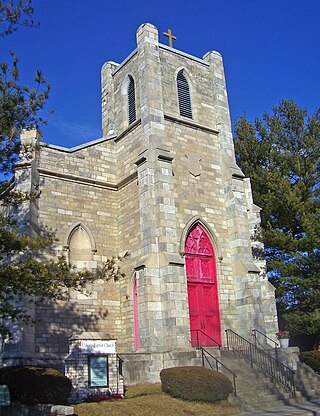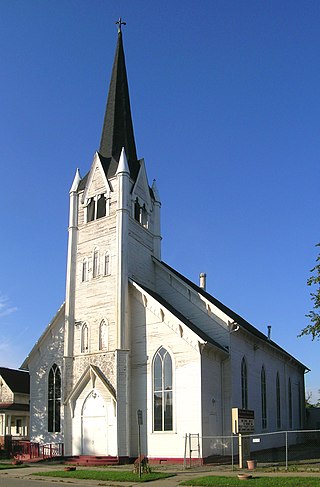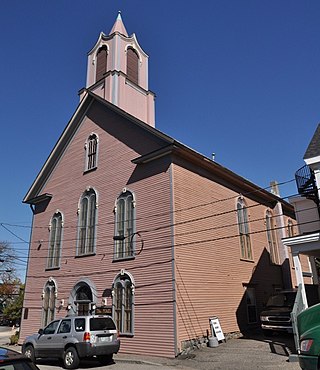
First African Baptist Church, located in Savannah, Georgia, claims to be derived from the first black Baptist congregation in North America. While it was not officially organized until 1788, it grew from members who founded a congregation in 1773. Its claim of "first" is contested by the Silver Bluff Baptist Church, Aiken County, South Carolina (1773), and the First Baptist Church of Petersburg, Virginia, whose congregation officially organized in 1774.

The Reformed Church of Beacon, originally the Reformed Dutch Church of Fishkill Landing, is a historic and architecturally-significant church in Beacon, New York. The congregation, who no longer occupies the building, claims it is the oldest church in Beacon. It is located on NY 9D about 0.5 miles (1 km) south of Beacon's municipal complex and downtown area and overlooks the Hudson River from a bluff.

Calvary Baptist Church, originally St. Paul's Episcopal Church, is located on St. Paul's Place in Ossining, New York, United States. It is a stone building in the Gothic Revival architectural style, considered the best preserved early example of that style in Westchester County. It is also one of the few remaining Calvin Pollard buildings in the state. Built in the 1830s, it is the oldest house of worship in the village. In 1978 it and its rectory across the street were added to the National Register of Historic Places.

The Silver Bluff Baptist Church was founded between 1774-1775 in Beech Island, South Carolina, by several enslaved African Americans who organized under elder David George.

The former First Baptist Church is a historic Baptist church building located at 8601 Woodward Avenue in Detroit, Michigan. Built in 1909, it was designed by architect Guy J. Vinton in the Late Gothic Revival style. It is now the Peoples Community Church. The building was added to the National Register of Historic Places on August 3, 1982.

The North Holderness Freewill Baptist Church–Holderness Historical Society Building is an historic church building in Holderness, New Hampshire. Built in 1860 for a Free Will Baptist congregation, it is a little-altered example of a rural vernacular church building. It was added to the National Register of Historic Places in 1986. The building was moved in 1994 from its original site on Owl Brook Road to U.S. Route 3 east of the center of Holderness by the Holderness Historic Society, who now own it.

The First Free Will Baptist Church are a historic Free Will Baptist Church complex in Ashland, New Hampshire. The complex consists of three buildings: the brick church building, which was built in 1834; the old vestry, a brick building standing near the street which was built c. 1835 as a school and converted to a vestry in 1878; and the new vestry, a wooden structure added in 1899 to join the two brick buildings together. The church, a fine vernacular Federal style building when it was built, had its interior extensively restyled in the late 19th and early 20th centuries. The complex was listed on the National Register of Historic Places in 1983, primarily as a good example of modest Victorian church architecture. It now houses the Ashland Community Church.

Augusta Downtown Historic District is a historic district that encompasses most of Downtown Augusta, Georgia and its pre-Civil War area.

The Gethsemane Evangelical Lutheran Church is a church located at 4461 Twenty-Eighth Street in Detroit, Michigan. It was designated a Michigan State Historic Site in 1980 and listed on the National Register of Historic Places in 1982. The building now houses the Motor City Missionary Baptist Church.

Oheb Shalom Congregation is an egalitarian, Conservative Jewish congregation and synagogue located in South Orange, Essex County, New Jersey, in the United States. The synagogue is affiliated with the United Synagogue of Conservative Judaism.

United Baptist Church of Lakeport is a historic church at 35 Park Street in the village of Lakeport in Laconia, New Hampshire, United States. Built in 1891 after a fire destroyed an older church, it is an eclectic local example of Late Victorian architecture. It was listed on the National Register of Historic Places in 1985.

The Freewill Baptist Church—Peoples Baptist Church—New Hope Church is a historic structure built in 1868 located at 45 Pearl Street in Portsmouth, New Hampshire. The building, a fine local example of Italianate ecclesiastical architecture, was once owned by an African-American congregation. It was listed on the National Register of Historic Places in September 2002, and the New Hampshire State Register of Historic Places in January 2002. Later home to the Portsmouth Pearl, a center of arts and culture, it has more recently hosted art exhibitions, theatrical productions, and event rentals. As of June 2021, the building is listed for sale at nearly $1.5 million.

The Grafton Congregational Church, known locally as The Brick Church, is a historic church on Main Street in Grafton, Vermont. Built in 1833, it is a fine local example of vernacular Greek Revival and Gothic Revival religious architecture. It was listed on the National Register of Historic Places in 1979. Grafton's current Congregationalist congregation now meets primarily in the "White Church" at 55 Main Street.

The Georgia Plain Baptist Church is a historic church in Georgia, Vermont. Built in 1877 for a congregation established in 1793, it is a well-preserved example of High Gothic Victorian architecture. It was listed on the National Register of Historic Places in 2001. The congregation is affiliated with the American Baptist Churches of Vermont and New Hampshire.

The First Baptist Church of Ossining is located in the center of the village of Ossining, New York, United States. It is a brick building in the Gothic Revival architectural style with a tall wooden steeple built in the 1870s, one of Ossining's most prominent landmarks. In 1973 it was listed on the National Register of Historic Places. Sixteen years later, in 1989, it was included as a contributing property to the Downtown Ossining Historic District when it was listed on the Register.

Shiloh Baptist Church is a historic Baptist church in King-Lincoln Bronzeville, Columbus, Ohio. One of the oldest black churches in the city, it has been active since the 1860s, and its 1920s building has been named a historic site.

Bethlehem Primitive Baptist Church and Cemetery is a historic site in Quitman, Georgia. It was added to the National Register of Historic Places in 2004. The church congregation was organized in 1834 and the church building was built c. 1861. It is located on County Road 125.
Church Square is a city block in downtown Columbus, Georgia home to two churches: First Baptist Church of Columbus and St. Luke United Methodist Church. The block, located between 2nd and 3rd Avenues and 11th and 12th Streets, is significant because it is the only remaining square designated for church use by Edward Lloyd Thomas, who surveyed the area in 1828 and drew up the original city plan. The square was listed on the National Register of Historic Places on December 2, 1980.

Brookline Baptist Church is a historic former church building at 632 Grassy brook Road in Brookline, Vermont. It was built in 1836 for a congregation established in 1785, and served the congregation regularly until 1945. It is now used as a community function space. It is a locally distinctive example of vernacular Gothic Revival architecture, and it was listed on the National Register of Historic Places in 2021.



















